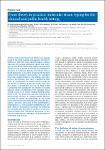From theory to practice: molecular strain typing for the clinical and public health setting
Goering, Richard V.
Köck, Robin
Grundmann, Hajo
Werner, Guido
Friedrich, Alexander W.
The persistence and transmission of infectious disease is one of the most enduring and daunting concerns in healthcare. Over the years, epidemiological analysis especially of bacterial etiological agents has undergone a remarkable evolutionary metamorphosis. While initially relying on purely phenotypic characterisation, advances in molecular biology have found translational application in a number of approaches to strain typing which commonly centre either on ‘epityping’ (molecular epidemiology) to characterise outbreaks, perform surveillance, and trace evolutionary pathways, or ‘pathotyping’ to compare strains based on the presence or absence of specific virulence or resistance genes. A perspective overview of strain typing is presented here considering the issues surrounding analyses which are employed in the localised clinical setting as well as at a more regional/national public health level. The discussion especially considers the shortcomings inherent in epidemiological analysis: less than full isolate characterisation by the typing method and limitations imposed by the available data, context, and time constraints of the epidemiological investigation (i.e. the available epidemiological window). However, the promises outweigh the pitfalls as one considers the potential for advances in genomic characterisation and information technology to provide an unprecedented aggregate of epidemiological information and analysis.
No license information

